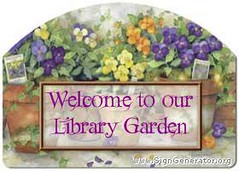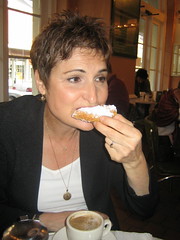
It has been a busy week at the Carnival grounds. Make sure you have plenty of pocorn and candy floss (aka cotton candy) and a large cup of soda before the show begins as you will need it. Prepare to be amazed and dazzled by the participants in edition #38 of the
Carnival of the Infosciences. Without futher ado... on with the show.
We started with a very early submission from David Bigwood of Catalogablog who stated "this is one of the best ideas I've seen in quite some time: Noting donations and donors in the OPAC". We here at the Library Garden agree that this is a fantastic idea.
Next in to the ring was was Ellysa from Infotangle who not only complimented us on the concept of the Library Garden (in her words: "I think it's a wonderful idea to form a blog which embraces a multitude of perspectives written by librarians of different backgrounds") but also pointed us to her post on Community 2.0 in which she defines several types of communities and gives some great examples of community in practice. Well done Ellysa and thanks for the compliment.
Ellysa was quickly followed by Bill Drew (Baby Boomer Librarian) linking us to his post Verizon giving information to NSA - My response. Bill remarks: "This started up my interest in the NSA and records of phone numbers I call."
After a brief intermission, we had Rick Roche asking for us to please consider his look back at the 1979 ALA Annual Conference meeting on government documants for the carnival. He comments in the post on how some concerns are the same though the technology has changed. A very interesting trip back in time and well worth the look!
Next in to the fray came Filipino Librarian who clearly feels that it is not enough to complain about the existence of librarian stereotypes and believes that "alternative images must be presented" and thus he submits his post, "I am a Librarian" for our reading and viewing pleasure. He also had an addendum to his entry in which he states "I just found out that there was a bit of a discussion last month about self-promotion. I guess this post falls under that category... but in a different direction :-) "
Anali from Grumpator gave us a thought-provoking summary of two talks she heard this week given by Joan Frye Williams.
And then we finish off the show the same way we started -- with an entry from David Bigwood who says: "I have never sent in a second submission for a week, but here I go. A couple of library students have created a tool, ClaimID, that has been getting good press in the Web 2.0 community but none in the L20 arena, that I've seen. "
We also got a P.S. from David Bigwood that contains a cool idea. David says: "Bootcamp sounds fun. What we need is a L20 and Web 2.0 conference. Get the folks from Digg, 37 signals, Amber McArthur, Leo Laporte together with Dan, Jenny, Steven et al. Now that would be one I'd not miss. " We here at LG wouldn't want to miss it either. Who wants to be on the organizing committee and get this conference off the ground?
Now for our picks of the week from the bloggers on Library Garden (we have a lot of editors, so we have a lot of picks):
We liked "It's all 'me'" from Library Marketing where Jill Stover talked about an WSJ article author who "predicts that consumer power will shift increasingly toward individuals who will declare what it is they want and marketers will be tasked with listening to and addressing those needs." We think Jill is right on the money when she suggests that "we [in the libraries] design and deliver our services [while being] proactive in listening for and addressing needs, and that we'll have to work very closely with patrons to provide customized services at their times and places of need." Very thought-provoking, both her blog response and the article itself.
Ricklibrarian caught our attention when he wrote about using Google Notebookfor Nonfiction readers' advisory. He created a sample notebook with links and text which he links to. Being able to bring all that information together easily and then having it available from any computer anywhere is just brilliant.
Best Sellers, Best Borrowed, Most Collected posted at Stephen's Lighthouse was also selected as a pick as it offers up another puzzle for the ages: Why do libraries insist on promoting bestsellers when it inevitably leads to frustration for users who then find themselves number 579 on the hold list forthe book?
Another fave was Ten Months In by Laura S. at Library Crunch talking about the Library 2.0 discussion, and where you can listen to her article. Here is the quote that really got our attention: "We now have a clear, yet fluid definition [of Library 2.0]: user collaboration, constant and purposeful change, and reaching the long tail. Librarians from around the world are discussing this concept. It is a topic at conferences, courses are being taught on it, there are a growing number of librarians blogging it, and books are being written on it, including one by Michael and me." We at the LG are looking forward to their upcoming book on this topic!
We also liked Michael Stephens pointing out that Hennepin County Library is now allowing customer comments in the catalog and Meredith Farkas sharing some deeply personal and inspirational thoughts on her evolution as a librarian, and as a person. Also worth a look is LizB's "good news, bad news"post on attending a Career Fair posted over at Pop Goes the Library.
And this week would not be complete without a nod towards the debate surrounding ALA's Library 2.0 Bootcamp. Lots of good posts on this topic, but as the Carnival ringmasters we are going to point you to Library Garden's own Peter Bromberg who weighs in with his take on the conversation and also offers us a chance to contribute and discuss the topic at the eltuo wiki .
Well, that's a wrap for this week carnival. It has been fun hosting and we hope to hoist the carnival tent in our garden again at some future date. The carnival is moving grounds and setting up over at What I Learned Today, so remember to submit early and submit often!

















